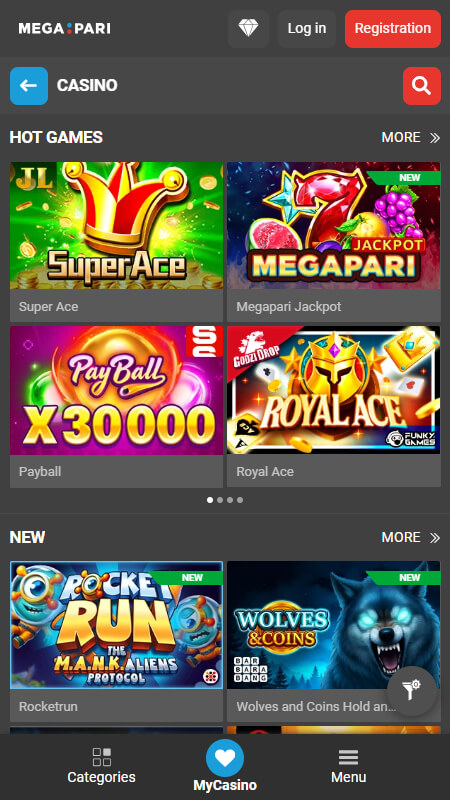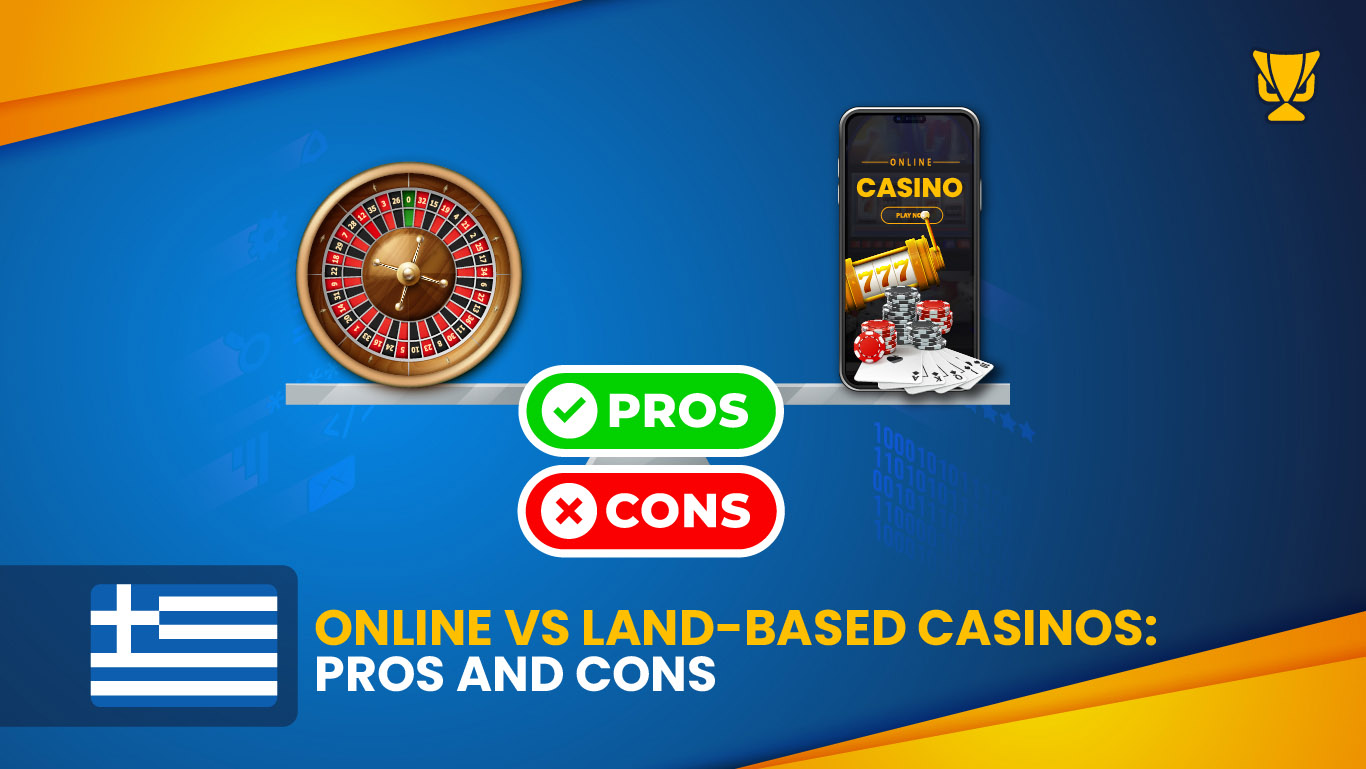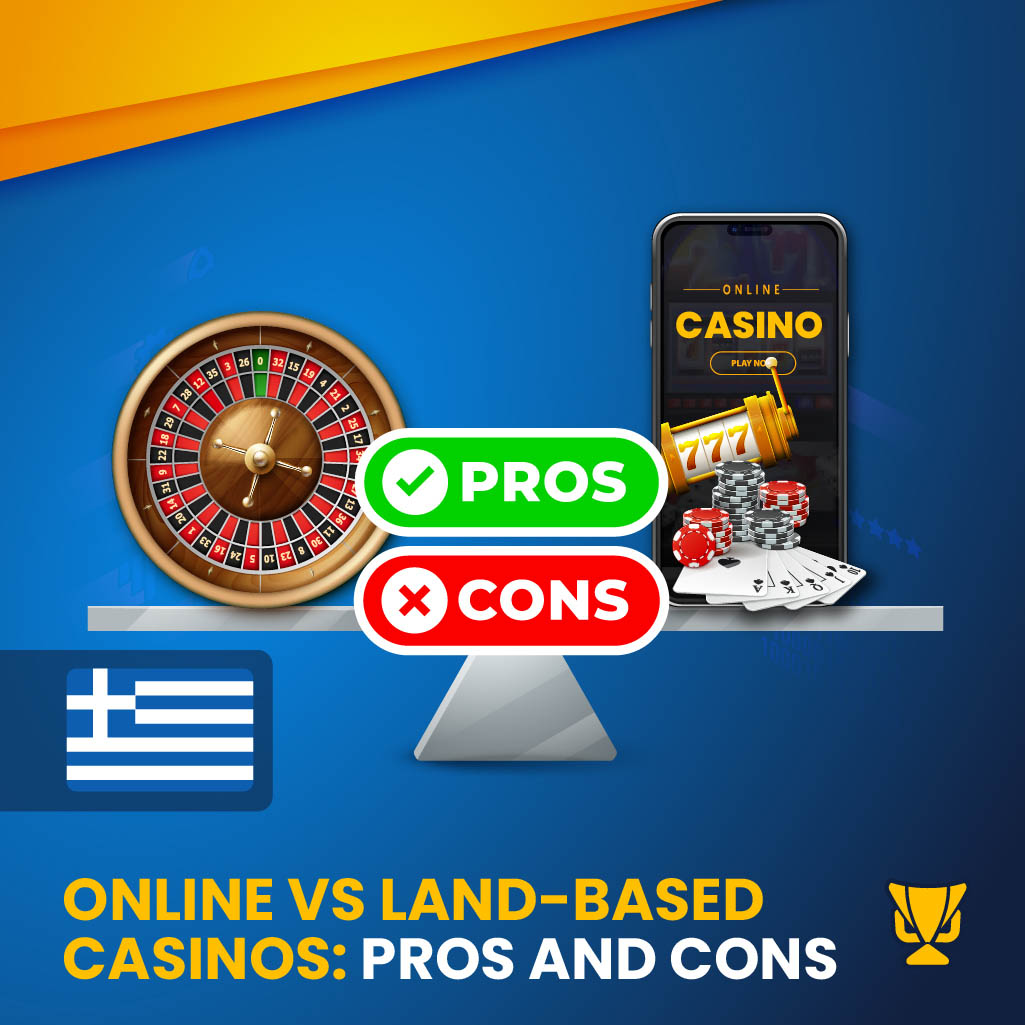Best Online Casinos In Greece: Full Guide for Greek Players
⏲️ Reading time: 23 minutes

In Greece, online casinos have become a sought-after alternative to sports gambling since their legalization in 2011. These platforms offer a varied gambling experience and have remained popular even during disruptions in sports betting, like during the COVID-19 pandemic. Online crypto casinos play a vital role in Greece's gambling landscape, contributing significantly to tax revenue.
| Rank | Casino | Rating | Bonus | Get bonus |
|---|---|---|---|---|
| 1 |  BillyBets | 4.5/5 | 100% Welcome Bonus up to €500 + 200 FS | Read review |
| 2 | Nomini | 4.5/5 | 100% Bonus up to 500 EUR + 200FS + 1 Bonus Crab | Read review |
| 3 |  Casino Infinity | 4.8/5 | 100% Welcome Bonus up to €500 + 200 FS | Read review |
| 4 |  Mr. Pacho | 4.5/5 | 100% Welcome Bonus up to €500 + 200 FS | Read review |
| 5 | Drip Casino | 4.5/5 | Welcome bonus 150% up to €600 | Read review |
| 6 |  Boomerang Casino | 4.5/5 | 100% Welcome Bonus up to 500 EUR + 200 FS | Read review |
| 7 |  Megapari | 4.8/5 | 100% welcome bonus up to €1500 | Read review |
This article is a comprehensive guide to the best online casinos for Greek players, covering everything from top reviews and generous bonuses to essential features tailored for players in Greece. Whether you’re new or experienced, explore trusted sites, learn about exciting bonuses, and get insights into safe, enjoyable Greek online casino experiences.

Online casinos in Greece have gained significant popularity since they became legal, offering players a convenient way to enjoy their favorite games from the comfort of their own homes. The rise of online gambling was further accelerated by the COVID-19 pandemic, as lockdowns and restrictions led many to seek alternative forms of entertainment. This shift in behavior helped numerous online casinos establish themselves in the Greek market, making it a thriving and competitive industry.
So, let’s all dive into the most popular online casinos in Greece:
The history of casino gambling in Greece has been a journey of regulatory shifts and market evolution. In 2002, the Greek government imposed a ban on all forms of online gambling to combat organized crime, which included even online video games like chess. This blanket prohibition was challenged both domestically and by the European Commission.
In response to the financial crisis of 2008, Greek authorities moved to tap into gambling revenues. A 2011 law repealed the 2002 ban, allowing temporary licenses for online gambling and sports betting operators.
However, this led to a state-run monopoly by OPAP, a state-owned lottery and betting organization, drawing criticism for unfair practices and violation of EU standards. The European Court of Justice ruled this monopoly unlawful in 2013.
Efforts to re-regulate the industry began around 2013, leading to 15 online gambling licenses by the Hellenic Gaming Commission (HGC) in July 2021, marking the first permanent licenses since 2002. With stringent regulations similar to those in the UK, these licenses aimed to foster a more competitive and fair market.
Gambling in Greece contributes substantially to state revenue, with a comprehensive tax structure ensuring financial transparency. Lottery and football prediction winnings are taxed at 10%, after a €100 deduction, with the responsibility for this tax falling on the winners.
For fixed or variable odds betting that exceeds €146.74, a 5% public levy is applied, retained, and paid to the Ministry of Finance by OPAP.
Additionally, gross annual income from lotteries like "Lotto" and "PROTO" is subject to various taxation rates. This includes payments to the state's general budget, the Ministry of Culture, and other governmental departments.
The law also dictates significant financial commitments for free spins casinos, including licensing fees, percentage contributions of gross profits, and an annual fee for maintaining a casino license. These diverse tax regulations ensure the gambling industry's significant contribution to Greece's fiscal health.
Greece's top online casinos combine historical themes with contemporary gaming. They offer traditional Greek mythology-based games, modern slots, and table games. These platforms are user-friendly and mobile-compatible, and adhere to strict regulatory standards, ensuring a safe gaming experience.

Starda is known for its extensive selection of classic and modern slot games, appealing to various players within the Greek casino industry.
| 💰 Welcome Bonus | Up to €500 + 100 Free Spins |
| 🎲 Popular Casino Games | Slots, Blackjack, Roulette, Poker, and Baccarat |
| ♠️ Suppliers | Microgaming, NetEnt, Pragmatic Play, Evolution Gaming, Quickspin, Play’n GO, Yggdrasil, Ezugi |
| 💳 Payment methods | Visa, Mastercard, E-wallets, Cryptocurrencies, Prepaid cards, Bank Transfer |
| 💬 Customer Service | Live Chat, Email |
| ⚠️ Minimum Deposit | €10 |

Megapari stands out in the Greek casino market for its impressive live dealer games and a vast array of table games.
| 💰 Welcome Bonus | Up to €300 + 300 Free Spins |
| 🎲 Popular Casino Games | Slots, Blackjack, Roulette, Poker, and Baccarat |
| ♠️ Suppliers | Microgaming, NetEnt, Pragmatic Play, Evolution Gaming, Ezugi, Betsoft, Playtech, Quickspin, Thunderkick |
| 💳 Payment methods | Visa, Mastercard, E-wallets, Cryptocurrencies, Prepaid cards, Bank Transfer |
| 💬 Customer Service | 24/7 Live Chat, Email, Phone |
| ⚠️ Minimum Deposit | €10 |

SolCasino distinguishes itself in the Greek online casino scene with its user-friendly interface and generous bonus schemes.
| 💰 Welcome Bonus | Up to €1000 + 200 Free Spins |
| 🎲 Popular Casino Games | Slots, Blackjack, Roulette, Poker, and Baccarat |
| ♠️ Suppliers | Microgaming, NetEnt, Playtech, Evolution Gaming, Ezugi, Pragmatic Play, Yggdrasil, Quickspin, Nolimit City |
| 💳 Payment methods | Visa, Mastercard, E-wallets, Cryptocurrencies, Prepaid cards, Bank Transfer |
| 💬 Customer Service | Live Chat, Email |
| ⚠️ Minimum Deposit | €10 |

Fresh Casino is popular in Greece for its vibrant, modern design and various innovative slot games.
| 💰 Welcome Bonus | Up to €200 + 200 Free Spins |
| 🎲 Popular Casino Games | Slots, Blackjack, Roulette, Poker, and Baccarat |
| ♠️ Suppliers | Microgaming, NetEnt, Playtech, Evolution Gaming, Ezugi, Pragmatic Play, Yggdrasil, Quickspin, Nolimit City |
| 💳 Payment methods | Visa, Mastercard, E-wallets, Cryptocurrencies, Prepaid cards, Bank Transfer |
| 💬 Customer Service | Live Chat, Email |
| ⚠️ Minimum Deposit | €20 |

JetCasino is recognized in the Greek casino industry for its fast-paced gaming environment and extensive range of high-quality video slots.
| 💰 Welcome Bonus | Up to €300 + 100 Free Spins |
| 🎲 Popular Casino Games | Slots, Blackjack, Roulette, Poker, and Baccarat |
| ♠️ Suppliers | Microgaming, NetEnt, Playtech, Evolution Gaming, Ezugi, Pragmatic Play, Yggdrasil, Quickspin, Nolimit City |
| 💳 Payment methods | Visa, Mastercard, E-wallets, Cryptocurrencies, Prepaid cards, Bank Transfer |
| 💬 Customer Service | Live Chat, Email |
| ⚠️ Minimum Deposit | €10 |
To help you discover the best online casinos, our experts leave nothing to chance, assessing each platform across a range of important factors. From exciting bonuses to high-level security and lightning-fast payouts, we focus on the details that make a difference. Whether you’re new to online casinos or a seasoned player, our thorough approach helps you find the right match. Keep reading to explore the high standards we use to rate and recommend the best options.
A valid license is a crucial factor when selecting an online casino in Greece. Before making any bets, players must be confident that the platform operates legally and ethically. A trustworthy casino should clearly display its license information, ensuring players that their experience will be safe and transparent.
When assessing an online casino, security plays a vital role. The sites we recommend are recognized for their reliability, employing advanced SSL encryption to protect player information. Furthermore, these platforms have been thoroughly tested and approved by many users, ensuring a safe and reliable gaming experience.
Bonuses and promotions add significant value to the gambling experience, which is why we scrutinize the offers for both new and returning players. Our checks include looking at the bonus terms, such as wagering requirements, expiration periods, and other conditions, to make sure the promotions are fair and beneficial.
The presence of a wide variety of games allows players to choose the ones that offer the best rewards, making it an important aspect when picking a Greek online casino. Additionally, having many options gives players the flexibility to switch things up when they want to try something new.
Smooth and quick payment processing is vital for an uninterrupted betting experience. Prompt deposits and withdrawals help players manage their funds efficiently, granting easy access to winnings and facilitating hassle-free transactions. The range of payment options is a key consideration when choosing online casinos, as it provides players with choices that fit their individual preferences.
Having reliable customer support is crucial for addressing any problems players may encounter, ensuring they get assistance when they need it. To assess this, we test the available contact options and reach out to customer service through different channels.
If you’re curious about getting started at an online casino, we’ve got you covered. Just follow our simple, step-by-step guide:
Begin by selecting a trustworthy Greek online casino with a proper license to ensure fair play and secure transactions.
Create your account by entering the necessary personal information in the registration form.
Complete the required ID verification process to confirm your identity and protect your account.
Carefully go through the casino’s terms and conditions, paying special attention to bonus requirements.
Select your preferred payment method and deposit funds to start betting.
Take advantage of any available bonuses by activating them when making your deposit. Don’t forget to get familiar with the wagering requirements.
Start playing, explore games, and enjoy your experience!


Online casinos offer flexible access, a wider range of games, and frequent bonuses, making them convenient and private. However, they may lack the social, sensory atmosphere of land-based casinos, which provide in-person interaction and a lively environment. While online platforms allow easy deposits and practice options, security is a vital consideration, especially as some sites are unlicensed. Land-based casinos, though sometimes less accessible, offer traditional experiences and straightforward, cash-based transactions but may lack the range of games and bonuses online players enjoy.
Let’s dive into this table for a better understanding.
| Features | Online Casinos | Land-Based Casinos |
|---|---|---|
| 🤝 Accessibility | Play anytime, anywhere, with internet access. | Fixed location, set hours |
| 👏 Convenience | Play from home or on a mobile device | Requires travel and has a dress code |
| 💬 Social interaction | Solo experience, live chat available with some games | In-person, social atmosphere |
| 🎁 Bonuses and promotions | Frequent bonuses like welcome offers | Rare promotions and very rare loyalty rewards |
| 💰 Accessibility of funds | Multiple methods (cards, eWallets, crypto) | Cash or card payments at the cashier |
Bonuses in Greek online casinos provide an excellent opportunity to enhance your gaming experience, giving players extra value when they sign up or make deposits. These bonuses are designed to attract new players and reward loyal customers, offering extra funds, free spins, or other perks. To claim a bonus, players generally need to register with a casino, make a qualifying deposit, or fulfill specific terms, such as using a promo code.
Greek online casinos offer a variety of bonuses, including welcome bonuses for new players, no deposit bonuses for risk-free exploration, and free spins for specific slots. Additional bonuses like reload offers for existing players and cashback deals help enhance the gaming experience by providing extra value and protection.
With these bonuses, you get added value for your play, increasing your chances to win and extending your gaming sessions. Up next, we’ll dive into the different types of bonuses available and what each one brings to your experience.
This bonus is typically granted when you register at the casino, offering players a welcome reward for signing up. The size of the bonus can vary depending on the casino, with some offering a percentage of the first deposit or a fixed amount. To receive this bonus, players generally need to meet certain conditions, such as making a minimum deposit or completing specific wagering requirements before they can withdraw any winnings.
A first deposit bonus is a popular promotion that online casinos offer to new players once they make their first deposit. Usually, the bonus matches a portion of the deposit, often 100% or more, and is added directly to the player’s account. To claim this incentive, simply sign up and deposit funds into your account. In most cases, the bonus is credited automatically, providing you with extra money to start playing immediately.
Free spins are a bonus that allows players to spin specific slots for free. To claim them, select a casino that offers them, choose your preferred option, and click to obtain the incentive. Most casinos require wagering, meaning winnings must be played through before they can be withdrawn, but some offer no-wagering free spins, allowing immediate cashout.
The cashback bonus is given as a percentage of your net losses over a specified period or on a particular game. Essentially, this bonus allows you to recover a portion of the money you’ve lost, with the return percentage typically falling between 5% and 25%.
A VIP program is a special offering designed for high-spending players at online casinos. Many casinos provide exclusive VIP or loyalty programs to reward their most dedicated users. These programs offer a range of benefits that increase as players progress through different levels, with rewards based on factors like spending and time spent at the casino. Benefits may include special bonuses, personalized customer support, free spins, or even physical prizes.
Greek online casinos feature vibrant, Mediterranean-inspired designs and a variety of games, including Greek-themed slots. They are known for their immersive experience and generous bonuses, operating under a fair regulatory framework. The table below compares the features of Greece's top 5 online casinos.
| Casino | Welcome Bonus | Games Available | Live Games | Minimum Deposit (€) | Withdrawal Time |
|---|---|---|---|---|---|
 | Up to €300 + 300 Free Spins | Slots, Table games, Live Casino games | Yes | €10 | Up to 24 hours |
 | Up to €300 + 300 Free Spins | Slots, Table games, Live Casino games | Yes | €10 | Up to 48 hours |
 | Up to €1000 + 200 Free Spins | Slots, Table games, Live Casino games | Yes | €10 | Up to 24 hours |
 | Up to €200 + 200 Free Spins | Slots, Table games, Live Casino games | Yes | €20 | Up to 24 hours |
 | Up to €300 + 100 Free Spins | Slots, Table games, Live Casino games | Yes | €10 | Up to 48 hours |
The Gambling Laws and Regulations in Greece for online casinos have undergone significant changes, particularly since the Gambling Act of 2011. This act marked the legalization of land-based slots and online gambling, leading to the issuance of 24 interim licenses to private operators.
Previously, the Greek Organisation of Football Prognostics (OPAP) held a monopoly on various gambling forms, including online poker and sports betting. However, this monopoly ended in 2021, paving the way for private operators.
The Hellenic Gaming Commission oversees land-based and online gambling licensing in Greece. By 2021, around 15 online gambling site licenses had been granted. The legal framework includes age restrictions, requiring individuals to gamble at least 21 years old and, in some cases, 23.
Tax regulations are stringent, with operators facing a 35% tax on free game casinos' gambling revenues and players taxed on their winnings. This regulatory environment, now more open and competitive, allows for a diverse range of gambling activities, including casino games, poker, and sports betting, with several operators licensed under the new regime.
| 🌎 Country | Greece |
| 👌 Language | Greek (official), English (widely spoken), and other minority languages |
| 💰 Currency | Euro (€) |
| 🎰 Popular Casino Games | Poker, Blackjack, and Roulette |
| ⚖️ Is Gambling Legal? | Yes, both land-based and online gambling are legal in Greece. |
| 🕵️ Gambling Regulator | Hellenic Gaming Commission (EEP) |
| 📃 Gambling Tax | Winnings from gambling are subject to a 15% tax for amounts between €100 and €500 and a 20% tax for payments exceeding €500. |
| 💳 Popular Payment Methods | Credit/debit cards, bank transfers, e-wallets (Neteller, Skrill, PayPal), prepaid cards |
The Greek Gambling Act has undergone several amendments to shape the current online gambling landscape. Initially, all forms of online gambling were banned in Greece, with the prohibition enforced under Article 17(1) of Law 3229/2004.
However, the landscape began to change with Law 4002/2011, which introduced a licensing system for online gambling. This law prevents access to casinos in Greece without verification. Still, it temporarily allows operators licensed in the European Economic Area (EEA) to offer services in Greece, subject to retroactively taxing their past profits.
The Greek gambling landscape underwent a transformative update with the enactment of Law 4635/2019, revising the earlier Law 4002/2011. This reform departed from the previous method of public tenders, ushering in a new era of fixed-term, renewable licensing for online gambling ventures.
The revised legal structure offers two distinct license categories: Type 1, catering to online betting, including actual events, fantasy sports, and virtual happenings, and Type 2, designated for various online games of chance, such as casino offerings and poker.
Aspiring holders of a Type 1 license face a fee of EUR 3 million, whereas Type 2 licenses come for EUR 2 million. Each license type is granted a renewable lifespan of seven years, signaling a progressive step in regulating and nurturing the online gambling sector in Greece.
The Hellenic Gaming Commission grants licenses within two months of receiving an application, provided all conditions are met, including technical and financial requirements, fit and proper assessment, submission of a performance guarantee, and payment of license fees.
This new regulatory framework aims to establish a solid online gambling market for 1 Euro casinos in Greece, ensuring effective supervisory oversight and resolving legal uncertainties that previously plagued the sector.
In Greece minimum deposit casinos in Greece cater to diverse preferences, offering an extensive selection of casino games. Popular choices among Greek players include live versions of classic casino games like poker, blackjack, and roulette. These Live casinos in Greece provide a real-time, interactive experience, replicating the feel of a traditional casino environment.
Greek online casinos focus on stocking various game types from well-known and reputable software developers, ensuring a rich and varied gaming experience. While specific statistics on the most popular games in the past year are not available, the commitment of Greek online casinos to offering a comprehensive selection of titles indicates a vibrant and dynamic gaming culture.
Slot games are a favorite among casino players because of their simple mechanics and exciting features, such as bonus rounds and special symbols like wilds and scatters. With options ranging from classic 3-reel slots to dynamic video slots and even progressive jackpots, there’s something for every player. The goal is to align identical symbols along the paylines, with different types offering various themes and chances to win.
Blackjack is a skill-based game offering some of the best odds in the casino. The goal is to reach a hand total as close to 21 as possible without going over. Players can enhance their chances by using strategies like card counting or an odds calculator to make informed decisions on whether to hit or stand. Variants such as European Blackjack, Spanish 21, and Pontoon each bring their own rules and nuances to the table, but the essence of the game remains the same—outsmarting the dealer using strategy and luck.
Roulette is a timeless casino classic; it’s the most popular live game, known as the “Queen” of casino games, where players place bets on where they think a spinning ball will land on a numbered wheel. The three main versions—European, American, and French—differ in layout and odds. Success in roulette depends on making the right bets, with various betting strategies like Martingale or Fibonacci offering ways to manage wagers for better returns. Each roulette type introduces its own unique twists to the betting system.
Baccarat, a classic card game that originated in France in the 1800s, remains a popular choice in both land-based and online casinos. In the game, players bet on whether the player’s or banker’s hand will be closest to 9 or if a tie will occur. Tens and face cards are worth zero, while cards 2 through 9 are counted at face value. The objective is to get as close to 9 as possible without going over, with only the second digit of the total counted if the hand exceeds 9. Variations like Chemin de Fer and Mini Baccarat introduce different rules and gameplay styles, but the goal of achieving the highest hand value remains the same.
Combining poker’s strategic depth with the simplicity of slot machines, video poker gives players five cards to form the best possible hand. Popular versions, including Jacks or Better, Deuces Wild, and Joker Poker, each have their own payout structures and strategies. Players choose which cards to keep and which to discard, aiming to form winning combinations based on the paytable.


Greek mobile casinos offer players the freedom to enjoy casino games on their iPhone or Android devices, providing a mobile-friendly version of the platform. These versions are designed for fast loading and seamless gameplay, so you can play anytime, anywhere. While some games may be unavailable on mobile, all the popular slots and table games are accessible. With HTML5 technology, Greek casinos have moved away from outdated Flash plugins, ensuring a smooth and enjoyable gaming experience on mobile.
In Greece, several prominent casino brands such as Boomerang, BillyBets, Casino Infinity, SpinBetter, and Legiano are making waves in the online gaming scene. Each of these casinos offers unique features and experiences, which we’ll explore in detail in the table below.
Live casinos combine the convenience of online gaming with the authenticity of a traditional casino experience. On these platforms, real dealers operate live tables, offering a dynamic environment that mirrors a land-based casino. One key advantage is the interaction with professional dealers in real time, enhancing the excitement of the game. Whether you’re playing blackjack, roulette, or baccarat, live casinos deliver an immersive atmosphere that allows players to feel as if they are sitting at a physical table, all from the comfort of their own homes. This interaction also fosters a sense of connection with the dealer and other players, making the experience more social and enjoyable.
New Greek online casinos are bringing fresh excitement to the gaming scene, offering modern features, exclusive bonuses, and enhanced security tailored for Greek players. Take a look at what we have prepared.
| Rank | Bookmaker | Rating | Bonus | Get bonus |
|---|---|---|---|---|
| 1 |  Boomerang-bet | 4.5/5 | 100% welcome bonus up to €100 | Read review |
| 2 |  Billybets | 4.8/5 | Welcome bonus 100% up to €100 | Read review |
| 3 |  Casino Infinity | 4.5/5 | 100% First deposit bonus up to €200 | Read review |
In Greece, the variety of payment methods accepted by online casinos is a crucial indicator of their quality and trustworthiness. A wide range of payment options suggests that Real money casinos can cater to a diverse customer base and are captivated by major financial institutions. Withdrawals are a priority, and Greek online casinos typically offer several payment methods in EUR.
In the landscape of Greece's online casinos, the spotlight often shines not only on the games but also on the individuals who have achieved extraordinary wins. In the last five years, Greek players have amassed an incredible $19,776,510 through 1108 individual victories, averaging about $17,848 per win on instant withdrawal casinos.
At the forefront of these high achievers is Georgios M., whose expertise, especially in the progressive slot game Mega Moolah, has been nothing short of spectacular. In a remarkable turn of fortune, Georgios M. clinched a monumental win of €6,374,599.92 in May 2009 at River Belle Casino and continued his winning streak in April 2010 with a substantial $2,767,608 win.
Other prominent winners include VASILIKI, who bagged €359,240 from the best new casinos playing Desert Treasure II, and C. Z., who garnered €98,610.18 in Iron Man.
Among the many games, Mega Moolah is the top choice in Greece, accounting for an immense total win of $10,099,415 from just three wins, averaging an impressive $3,366,471.71 per win.
The list of favored games also features Vegas Strip Blackjack, Desert Treasure II, and Break da Bank Again, each contributing to the dynamic and prosperous environment of Greek online casinos. These games, available on no deposit bonus casinos, and their winners exemplify the blend of skill, luck, and excitement that captivates the Greek online casino experience.
The online casino market in Greece is promising growth. Initially banning online gambling in 2002, Greece embraced it in 2011 with temporary licenses, moving away from a state monopoly.
In July 2021, the Hellenic Gaming Commission granted permanent licenses to 15 iGaming operators, marking a mature market with a €2 million license fee. New casinos in Greece, like Spinomenal and Relax Gaming, are diversifying the market and are expected to collaborate with local operators.
Efforts to eliminate illegal operations further strengthen the market. The Greek gaming industry is poised for significant growth and diversification in 2026 and beyond, offering more options to consumers and boosting the economy.


If you’re a newcomer to online casinos, these tips will help you enhance your winning potential:





Gambling addiction is a big problem in Greece due to the increasing number of online casino sites. KETHEA, the Therapy Center for Dependent Individuals, plays a significant role in helping people with this issue. They offer help, therapy, and programs to recover for people dealing with gambling addiction.
For those who need help immediately, there is a helpline in Greece called Gambling Therapy. This service gives essential support and advice to people and their families who are dealing with problems caused by gambling.
KETHEA and other healthcare experts in Greece are there to offer more information and help to anyone who needs it. They are a good point of contact for those facing challenges with gambling addiction.
When choosing an online casino accepting players from Greece, consider the legality under the 2011 Gambling Act, player age restrictions (over 21), and the site's licensing, especially by the Hellenic Gaming Commission. Many online casinos welcome Greek players, offering site translations and accepting Euros and US Dollars. Ensure the casino is compliant with Greek regulations and offers suitable games and bonuses.
There are several top-rated online casinos in Greece, each appealing to different preferences, such as game variety, user experience, and bonuses. The best choice depends on individual player needs.
Yes, both online and land-based gambling are legal in Greece. The industry is frequently regulated, allowing several international online casino providers to accept Greek customers.
Many online casinos, especially mobile casinos in Greece, offer fast withdrawal methods. These casinos are compatible with iOS and Android devices and provide rapid withdrawal options.
Yes, reputable online casinos in Greece ensure secure deposits and withdrawals. They use encrypted systems and firewalls, and their transaction methods include globally recognized and safe payment processors.